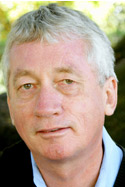One of the world’s pre-eminent primatologists discusses his ground-breaking discoveries on the connections between primate and human behavior, from aggression to morality and culture, in a Lawrence University convocation.

Frans de Waal, C. H. Candler Professor in the psychology department at Emory University, presents “Morality Before Religion: Empathy, Fairness and Prosocial Primates,” Thursday, Feb. 2 at 11:10 a.m. in the Lawrence Memorial Chapel. de Waal also will conduct a question-and-answer session at 1:30 p.m. in the Warch Campus Center cinema. Both events are free and open to the public.
Born in the Netherlands, de Waal began observing primate behavior at the Arnhem Zoo while a student at the University of Utrecht. His observations of a colony of 25 chimpanzees over a six-year period provided the basis for his 2005 book “Our Inner Ape.”
de Waal, who directs the Living Links Center at the Yerkes National Primate Research Center in Atlanta, the oldest and largest primate research institute in the nation, is credited with introducing the term “Machiavellian” to the vocabulary of primatologists. In his first book, “Chimpanzee Politics,” he compared the schmoozing and scheming of chimpanzees involved in power struggles with that of human politicians. In 1994, then-Speaker of the House Newt Gingrich put “Chimpanzee Politics” on the recommended reading list for all freshmen Congressmen.
His research led to the discovery of reconciliation among primates and the founding of the field of animal conflict resolution. In 2007, Time Magazine named him one of the “100 World’s Most Influential People Today.”
de Waal came to the United States in 1981 and spent the first 10 years of his American career with the Wisconsin National Primate Research Center in Madison. He is the author of 13 books on primate behavior, among them 2009’s “The Age of Empathy: Nature’s Lessons for a Kinder Society,” “Primates and Philosophers: How Morality Evolved,” “Peacemaking Among Primates” and 1998’s “Bonobo: The Forgotten Ape,” the first book to combine and compare data from captivity and the field.
His research has earned him election to both the National Academy of Sciences and the Royal Dutch Academy of Sciences.
About Lawrence University
Founded in 1847, Lawrence University uniquely integrates a college of liberal arts and sciences with a world-class conservatory of music, both devoted exclusively to undergraduate education. Ranked among America’s best colleges, it was selected for inclusion in the book “Colleges That Change Lives: 40 Schools That Will Change the Way You Think About College.” Individualized learning, the development of multiple interests and community engagement are central to the Lawrence experience. Lawrence draws its 1,445 students from 44 states and 35 countries.